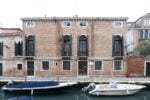57. Biennale – Padiglione armeno
.jpg)
Il Padiglione armeno sarà ospitato in due sedi: Collegio Armeno Moorat-Raphael, a Palazzo Zenobio, e Chiesa di Santa Croce degli Armeni, on Calle Dei Armeni.
Comunicato stampa
Jean Boghossian, a Brussels-based Lebanese artist, sculptor, and painter of Armenian descent, has been chosen to represent the Pavilion of the Republic of Armenia at the 57th Venice Biennale.
Titled “Fiamma Inestinguibile”, the exhibition, held from May 13 to November 26, 2017, will be curated by Bruno Corà, Italian art critic and President of the Fondazione Burri, and commissioned by the Ministry of Culture of the Republic of Armenia, represented by Svetlana Sahakyan.
The name of the exhibition is inspired by the blowtorch flame, which Boghossian uses as a flamboyant brush, leading to a passionate quest as flames transform to create inextinguishable art.
Works presented by Boghossian at the Venice Biennale will be displayed at two venues, Collegio Armeno Moorat-Raphael, at Palazzo Zenobio, and Chiesa di Santa Croce degli Armeni, on Calle Dei Armeni (Armenia Street).
Boghossian is one of the few artists globally who experiment by applying fire and smoke to various works. Fire is his artistic language of choice, and he uses a wide array of brushes and torches as his tools. Boghossian’s paintings are supported by artistic inspirations such as Jackson Pollock, Simon Hantaï, Joan Mitchell, and Yves Klein.
The artist will be showcasing the most advanced results of his painting experiences using diverse techniques and materials developed with fire, flame, smoke, pigments, and water. Objects burned often include various mediums such as canvas, paper, books, chairs, and paintings, at times leaving behind patterns of perforation, using distinctive and diverse techniques.



